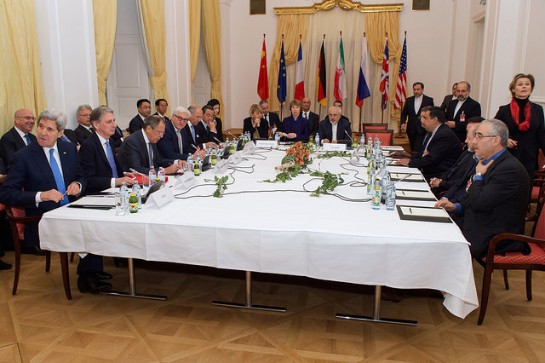
Falsely Framed Debates about Our Options on Iran
By BGen Stephen A. Cheney USMC (Ret.) & Mr. Sungtae “Jacky” Park
“No deal is better than a bad deal.” Such is the slogan often flaunted by those who believe that the Obama administration is being too soft on Iran with regard to its nuclear weapons program. They worry that the current deal being negotiated might leave Iran with the capability to construct a nuclear weapon in a short period of time and argue that tougher measures (i.e. sanctions and even military strikes) should be considered against Tehran. While the concern is justified, the current dilemma that faces the United States is not about choosing between a “good deal” and “tougher action” (more sanctions or military action). The two actual alternatives that Washington must choose between are an Iran without nuclear weapons as a result of a deal or an Iran with nuclear weapons which could eventually emerge out of failed negotiations.
If no deal is reached, the United States will have to increase the sanctions which might lead Iran to rush to build nuclear bombs. Then, the United States might be forced to choose between accepting a nuclear Iran or taking military action to stop it. But would military action, whether by the United States or Israel, solve the problem? What would such a move entail? As Commander Daniel Dolan (U.S. Navy, retired) aptly concludes in an article:
“…America may be at war with Iran for 10 years, spend trillions, and tens of thousands more people will die. The already unstable Middle East will be smoldering with chaos for years to come. In Iran, every paranoid prophecy of the Israeli-American conspiracy that was preached from podiums in Tehran, by the likes of Mahmud Ahmadinejad, will have been fulfilled. And if attacked, Iran will have every reason and all the motivation needed to try to build a nuclear weapon…”
Read Commander Dolan’s article, “Cowboys and Iranians,” here
Military strikes might set back Iran’s nuclear program for a few years. To ensure with certainty that the nuclear program is destroyed and to prevent it from being restarted in hidden facilities, the United States will have to force regime change and occupy Iran, which would be extraordinarily costly. In other words, no deal means that whether the United States decides to take military action or not, the end result will be highly detrimental to American interests. We will either have to accept a nuclear Iran (or set it back a few years at the most) or engage in a highly costly occupation of the country. The latter option is unthinkable for the United States which has many other critical issues to deal with around the world.
Fortunately, we have a deal within our reach. No agreement is perfect, and the current deal being negotiated will leave both sides less than completely satisfied. Iran will keep some of its enrichment capabilities, but they will also be under intrusive inspection regimes and will be limited. Given the cost of failing to reach an agreement, however, even an imperfect deal is better than a no deal.
BGen Stephen A. Cheney USMC (Ret.) is the CEO of the American Security Project
Sungtae “Jacky” Park is Middle East and Nuclear Security Analyst at the American Security Project.






[…] Falsely Framed Debates about Our Options on Iran […]
Well said. Along these lines, the part of the deal that involves removing enriched uranium gas from Iran rather than reduce the number of old-fashioned IR-1 centrifuges to very low numbers is very good. In case of breakout, the uranium gas can be hidden from military intervention, but not the centrifuges. Google “Goldston Iran Bulletin” to see my article on this at the Bulletin of the Atomic Scientists.
Thank you for the comment. We will definitely check out your article!
[…] backed by other dissenting voices in Washington, has taken a hardline stance on Iran, insisting that "no deal is better than a bad deal" that would allow Tehran to still be able to manufacture a […]
Hawks are not saying that in leu of a bad deal we should take military action. They are saying to increase sanctions, which is what brought Iran to the table in the first place, and wait until the West is in a better negotiating position in order to get a better deal. Because as it stand, this deal will eventually allow Iran to get a deal. Through the Obama administration’s many concessions, the negotiations have moved from attempting to prevent Iran from obtaining Nuclear capacity to containment to simply deciding when they will get nuclear weapons. The deal will allow Iran to remain a nuclear threshold state for 15 years, with the capacity to breakout in one year. That is not very reassuring. If at any point during those 15 years Iran decides to break the agreement (which wouldn’t be very surprising) it would take it one year to make a nuclear weapon – that is not a lot of time for the West to respond. And after the 15 year period, the inspections regime detailed in the agreement will not be able to inspect any covert operations, and as one famous scholar has noted, if Iran will not have a covert aspect to their program it would be the first time in 25 years it hasn’t.
*to get a nuclear weapon.